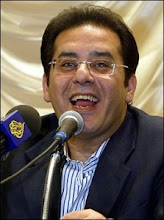 Mr Nour has called for the election to be repeated |
President Mubarak, in power for 24 years, won with 88.6% of the votes - in an election marked by low turnout.
Shouting "Hosni rigged the elections", they marched alongside Ghad party leader Ayman Nour.
Mr Nour and Wafd party leader Numan Gumaa - who got 7.6% and 2.9% of the vote respectively - dismissed the vote.
Complaints rejected
Police escorted the protesters but did not try to disperse them.
A small group of Mubarak supporters tried to stage a counter-demonstration, but police kept the two groups separate.
Members of the Kefaya (Enough) protest movement and the left-leaning Tagammu Party also marched with Mr Nour through the Cairo streets.
Egypt's electoral commission has rejected the candidates' complaints of a fraudulent result. It has also turned down Mr Nour's request for a re-run.
But groups monitoring the vote said there were widespread abuses, mainly by Mr Mubarak's National Democratic Party (NDP) and electoral officials.
However they say this would not have affected the overall result.
Ghad (Tomorrow) has insisted Mr Nour took at least 30% of the vote.
A Ghad spokesman said many of Mr Nour's supporters had been prevented from entering polling stations to vote.
Voters 'apathetic'
Mr Nour told the Associated Press news agency: "This is a farce. I will appeal to get our rights back."
However, other opposition figures said that while there had been flaws, the election had been more positive than expected.
Mr Mubarak, who previously had been elected only in single-candidate referendums, changed the system this year under pressure from the US and domestic political groups.

BBC Middle East correspondent Ian Pannell says the main problem for reformers is not the reports of fraud but rather that the vast majority of people chose to stay at home - turnout was just 23%.
Many were apathetic, or sceptical that this election would be any different to those held previously, he says, adding that there is little in the final result to persuade them otherwise.
Although Washington has welcomed the election, its reception in the Arab world has been more muted, our correspondent adds, reflecting a deep reservoir of caution about change.
BBC Cairo correspondent Heba Saleh says many in Egypt will be disappointed the opposition did not do better because it would have signalled the possibility of a more vibrant political life and speedier democratic transformation.




No comments:
Post a Comment